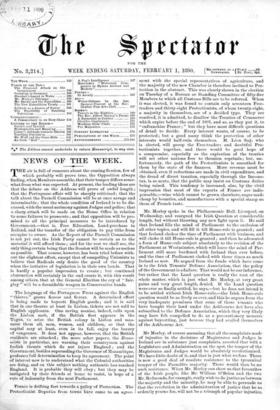France is drifting fast towards a policy of Protection. The
Protectionist Deputies from towns have come to an agree-
ment with the special representatives of agriculture, and the majority of the new Chamber is therefore inclined to Pro- tection in the abstract. This was clearly shown in the election on Tuesday of a Bureau or Standing Committee of fifty-five Members to which all Customs Bills are to be referred. When it was elected, it was found to contain only seventeen Free- traders and thirty-eight Protectionists, of whom twenty-eight, a majority in themselves, are of a decided type. They are resolved, it is admitted, to disallow the Treaties of Commerce which expire before the end of 1891, and so, as they put it, to "enfranchise France ; " but they have most difficult questions of detail to decide. Every interest wants, of course, to be protected ; but a good many think the protection of other interests would half-ruin themselves. M. Leon Say, who is elected, will group the Free-traders and doubtful Pro- tectionists together, and there would be good hope of a compromise, especially as the expiration of the treaties will set other nations free to threaten reprisals ; but, un- fortunately, the path of the Protectionists is smoothed for them by the state of the finances. More revenue must be obtained, even if reductions are made in civil expenditure, and the dread of direct taxation, especially through the Income- tax, is so acute, that the public may insist on Customs duties being raised. This tendency is increased, also, by the vivid impression that most of the exports of France are indis- pensable,—wine which cannot be grown elsewhere, sugar made cheap by bounties, and manufactures with a special stamp on them of French taste.


































